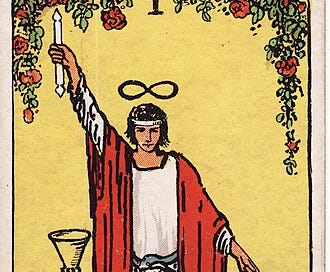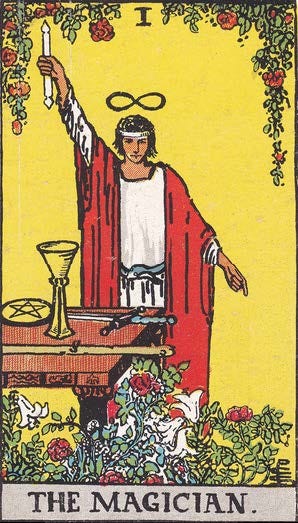Inside: An excerpt from my upcoming course Grief Magic, which is discounted for one more day!
Magic means something different to each of us, and like all our understandings, is likely changing for us all the time. I think that’s beautiful and important. I don’t want to define or lock in a singular understanding of magic or “grief magic” so much as share some of the context for my use of the phrase.
These quotes below in particular speak to different threads of magic and grief that I’m excited about. They gesture to something about the ways we sense ourselves, the world, and what’s possible. They gesture to a more deeply embodied sensing of the life and worlds around us that colonialism and capitalism seek to flatten:
“The biggest scam in history was to convince us magic wasn’t real…. Ritual and magic was the air that every human being breathed until fairly recently… There are few things more human than becoming embedded in the web of sentience that the magical traditions can offer.”
-Hanna Williams, Organic Abundance
“Things were surreal in the early days of death. Amidst all the awfulness that is the death of her, in the days and weeks following her death, I did appreciate the sense that anything was possible because nothing made sense. I really felt like I was experiencing multiple dimensions. Another world existed right there! ...Her death cracked me open to something I still can’t explain with words. It has made the world far less flat, made being alive far more incredible. I now feel enchanted by life in a way I never could have imagined before she died. The world felt terrible but also full of some kind of magic that made her presence visible in everything. I started to believe in multiple dimensions.”
- Chelsea Granger, So many ways to draw a ghost
"The task of the magician is to startle our senses and free us from outmoded ways of thinking."
-David Abram, The Ecology of Magic
Disenchantment as a tool of colonialism
In her book, Caliban and the Witch, Silvia Federici writes, “The world had to be ‘disenchanted’ in order to be dominated.” She shows how the persecution of magic, of “witches”, of people’s connection with land, seasonal rituals, and their own bodies, was crucial to privatizing land and disrupting collective power and resistance during the middle ages, and how this process was inextricable from colonial projects elsewhere. Witch-hunts and genocides were committed against indigenous people for their earth based traditions that valued ecological kinship over profit.
And so Empire continues targeting those with deep and wide understandings of kinship, uprooting people from the lands they love, destroying their olive groves, using weapons of sexual and gender violence, and mass murdering those who resist.
Our awe, reverence, enchantment, attunement to the world, has been intentionally disrupted by systems of oppression seeking to disrupt our relationships, our erotic power, our creativity, and our relationships with ourselves as bodies of land, as networks of kin inseparable from the land.
So I understand disenchantment to ourselves and one another and the world around us as a tool of colonialism. And I understand our re-enchantment as something that can trouble systems that depend on the denial of the magical in all things. Leaning into enchantment can help us stay with the trouble, and dare us to reach for each other.
Grief and Re-enchantment: Becoming Magicians
I’m interested in the ways that grief and enchantment are related. I’m interested in what grief can disenchant us from and re-enchant us to.
I’m interested in the ways that grief can make us into magicians.
And by that I mean I’m interested in the ways that grief disrupts colonial mentalities and ways of perceiving and moving through the world, and brings us back into deeper attunement with ourselves as ecosystems. I’m interested in the ways grief altars our perceptions, in the way grief itself is an altared state, and the ways grief altars the world. I’m interested in how grief itself is a magician.
If, as Sophie Strand shares in The Flowering Wand, “each death opens up a wound, and a song”, then perhaps the magician is the one who sings. We are unmade and remade by this singing, a singing of ourselves into the world as the world sings itself into us. As grievers, we may no longer see ourselves as neat and tidy individuals, but entangled webs of relationships and dimensions.
So our unraveling becomes a way that we witness how we too are woven through with the threads of mystery and change. And we recognize our own power to transform, and tell powerful stories about ourselves and what’s possible.
In the Magician card in the Rider-Waite tarot deck, a figure is behind an altar surrounded by roses, one hand gesturing towards the ground, rooting us to earth, and a hand held upward, reaching with a double sided wand towards the sky. This magician recognizes that within the ruins, uncertainty, and chaos of our lives, dwells the possibility to join the world in its endless changing and to live life as art together. The Magician is also a trickster, creating illusions, playing with perception, inviting us to play. Holding simultaneously the ways we are both ephemeral and still very much alive, the magician bows to, draws from, and becomes a channel for forces of change, creativity, and mystery. In stepping fully into this role, which is to say, their creative capacity, the magician gestures to a collective capacity to be both small and powerful together.
In grief, we learn to bear unbearable feelings alongside feelings of love and awe. Perhaps the magician is the wisdom of our animal bodies that allows us to be both ruined and blooming. As Martín Prechtel says, “we must be willing to fail magnificently.” This is not a passive surrender. It is a breaking and bursting into song, a celebration of voices that risk cracking and singing off key.
It is also a merging with the world. And it is risky.
The magician takes this risk. In their piece, “We Must Risk New Shapes,” Sophie Strand writes: “Becoming new is never safe. Survival is never safe. It is always a breach. A break in the skin. It is a leap across the abyss.”
For examples of this kind of risk taking and shapeshifting, we need only slow down enough to sense to the worlds around us and inside of us. We have never done grief, death, life, or magic alone, as individuals, or as a single species. The greatest magicians and shapeshifters are perhaps the ecosystems we find ourselves in, and other more than human beings.
Grief Magic 2025-2026 Now Enrolling!
If you are looking for a learning community to feel, dream, create, think, attune to ourselves and our ecosystems, wonder at the magic of being alive in these times, grieve and ride the winds of change as they come this year, registration is now open for Grief Magic 2025-2026.
A cohort of magicians, dreamers, creators, and grievers awaits.
Grief Magic: Time-bending, Shapeshifting, and Becoming Multitudes
Meet our Guest Instructors/Magicians✨ Each of these beings has contributed so much to my own understandings and practices of grief magic, and I’m so deeply grateful that they will be holding this container with us.
A Grief Welcoming Wheel-of-the-Year Course
This class emerges from a desire to sense ourselves in these times differently, to sense time and place themselves differently—to find ways of living that are more attuned to our bodies, our ecosystems, and our communities—while simultaneously allowing us to access something beyond urgency that actually enables us to continue showing up.
Think of it as a grief welcoming - wheel of the year - course.
Or a wheel of the year course that seeks to disrupt the ways that colonialism has tried to repress/deny grief as it attempts to flatten our sense of ourselves and the world.
Grief Magic seeks to remember grief as a part of our every day lives—rather than something that is somehow separate from lives steeped in loss.
In addition to exploring the above themes, we will also be exploring the following:
Ancestral Stories, Myths, and Timekeeping: Myths, Magic, and Folklore connected to the seasons and grief*
Tarot’s Major Arcana as guides for grief and creative process
Imagination Spells: Envisioning and Practicing Living Futures
Art, imagination, and grief as collaborators and ecological processes
Grief as Time Travel: Exploring constructions and experiences of space and time
Grief, Shapeshifting, De/Constructions of the self: becoming multitudes
The Politics of Enchantment: Mundane Magic, Care, and Enchantment in the Everyday
*While I’ll be drawing largely on European myth, folklore, and magic, students are encouraged to explore their own ancestral stories and practices.
Not interested in a cohort but want access to the course materials and guest workshops?
There is also a self paced study version of this course for those not interested in the cohort model! Learn more here.
Scholarship Forms Open through 4/3
Full and partial scholarships for low income and BIPOC students are available for the Grief Magic Cohort. Please complete an interest form by 4/3 for this next round of Grief Magic. 💖
Article Sources
Abram, D. (1996). The Spell of the Sensuous: Perception and Language in a More-Than-Human World (1st edition). Pantheon.
Emergence Magazine. (2020, July 20). The Ecology of Perception – David Abram. Retrieved April 2, 2024, from https://emergencemagazine.org/interview/the-ecology-of-perception/
Federici, S. (2004). Caliban and the Witch: Women, the Body and Primitive Accumulation (Illustrated edition). Autonomedia.
Granger, C. (2022). So Many Ways to Draw a Ghost.
London, S. (n.d.). The Ecology of Magic – An Interview with David Abram. Retrieved April 2, 2024, from https://scott.london/interviews/abram.html
Resilience. (2023, June 27). Coming to Our Animal Senses: A Conversation with David Abram. Resilience. https://www.resilience.org/stories/2023-06-27/coming-to-our-animal-senses-a-conversation-with-david-abram/
Strand, S. (2022a). The Flowering Wand: Rewilding the Sacred Masculine. Inner Traditions.
Strand, S. (2022b, June 4). We Must Risk New Shapes [Substack newsletter]. Make Me Good Soil.
Williams, Hannah. spiritual field guide (@organic.abundance). https://www.instagram.com/organic.abundance/







Such magical & beautiful weaving of words. So hopefilled. So much fire & softness at the same time. I believe you are very right when you say that reclaiming magic will disrupt the capitalistic system. This is so needed. Also I deeply appreciate this option of listening to you read to us. Thank you Mara!